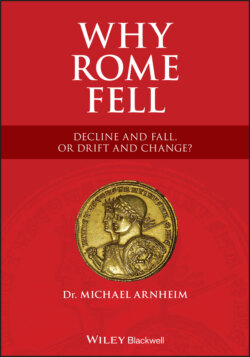Читать книгу Why Rome Fell - Michael Arnheim - Страница 69
Eunuchs
ОглавлениеA much less well-known aspect of Diocletian’s anti-aristocratic policy was his use of eunuchs, some of whom, according to Lactantius’s attack on him, held powerful positions. (Lactantius, De Mort. Pers. 15.) From the time of Constantius II (r. 337–361) onward, the position of praepositus sacri cubiculi (provost of the sacred bedchamber), usually translated as “grand chamberlain,” was regularly held by a eunuch. Though technically a servant in the imperial palace, the holder of this position in practice controlled access to the emperor, giving him tremendous power, and he headed up a bevy of junior cubicularii. It is possible that this important post was already held by a eunuch in the time of Diocletian, but there certainly were some eunuchs in his household, including some Christians, three of whom, namely Dorotheus and Petrus, cubicularii, and Gorgonius, an army officer, were executed during the Great Persecution.
Though sometimes attributed to deliberate aping of the Persian court on the part of Diocletian’s junior colleague and successor, Galerius, the use of eunuchs as chamberlains made perfect sense as a counterweight to the established elites. Keith Hopkins’s summary of the situation is probably only a slight exaggeration: “[T]he authority exercised by eunuchs not only by-passed the aristocracy but also served to supervise them.” (K. Hopkins 1963, p. 74.)
Of servile and often foreign origin, eunuchs owed their position entirely to imperial favor; and their services and lives could be terminated at a moment’s notice. However, with Diocletian, the long saga of the eunuch chamberlains was only just beginning. (See Chapters 4 and 5.)
